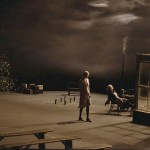Dir. by Lars von Trier
Images: Digital video, much of it hand-held, on a spare soundstage. Day and night are represented by flat white light and darkness. The homes and businesses of Dogville are constructed from white chalklines on the floor and from synechdodal objects — a church bell tower, a shop window, a medicine cabinet. Favorite images: The warm light on Grace’s face after she throws open Jack’s window, the God’s-eye views of Dogville, Grace surrounded by crates of apples on the bed of Ben’s truck, every shot of Harriet Andersson.
• • •
There’s little sense in writing about Dogville without discussing its final sequence, and there’s little sense in watching Dogville if you know how it ends. That’s your warning. If you haven’t seen the film, and if there’s even the slightest chance that you will someday, stop reading. Seriously. Or risk ruining a fascinating encounter with a remarkable film.
For the first two-and-a-half hours, Dogville is similar enough to Lars von Trier’s previous film, Dancer in the Dark, that it lulled me into a kind of detached resignation. Nicole Kidman’s Grace Mulligan wanders into the small, Depression-era town of Dogville, where she’s greeted at first with suspicion, then (with time) charity, then (with more time) abuse and scorn. Like Bjork’s Selma Jezkova in Dancer, Grace is too thick with allegorical weight to survive the inevitable tragedy, I was led to believe. She is a Flannery O’Connor character, I assumed, or a tall, blonde version of that donkey in Au Hasard Balthazar — grace offered, grace accepted, grace corrupted, and grace refused.
Being so detached, I was free to marvel at the film’s clashing styles: part fairy tale, part corn pone Americana, part Brechtian materialist commentary, Dogville wears its influences on its sleeves and doesn’t give a shit if you notice. That’s part of its charm, actually. Dogville is like an episode of The Simpsons for the angsty, agnostic, anti-corporation set: a patchwork of cultural references and competing mythologies so dense as to suffocate any message beneath all of the damned media. I relished it, though, and just knew that I was one step ahead.
But then, in the final act of the film, the gangster from whom Grace has been hiding out arrives in town and we learn that she’s one of them — a gangster, I mean. An ambivalent gangster, a gangster clinging desperately to the possibility of sacrifice and redemption, but a gangster nonetheless. After suffering quietly the countless lies and abuses heaped upon her by the townsfolk, Grace turns to her father and says, “If there is one town that the world would be better without, it’s Dogville.” And it’s done. Grace’s tormentors are Tommy-gunned in the most hyper-stylized sequence of an already hyper-stylized film, turning small town America into hell on earth.
Now, I wish I were making this part up . . .
I saw Dogville in a nearly empty theater last night. I say “nearly” empty because, other than myself, there were only two other people in the 1,000+ seat auditorium. They sat together, just two rows behind me, of course, and talked incessantly. When Grace sentenced Dogville to death, one of my tormentors cackled loudly and applauded. And here’s the thing: I shared his exhilaration. I did. As much as I love Dancer in the Dark, I can’t bring myself to watch it again — not all the way through, at least. It’s just too hard.
Viewers of Dogville, however, are spared the painful purging of classical catharsis and are instead treated to its late-20th century (and, as some might argue, American) equivalent: Rambo/Braveheart/Gladiator-style ass-kicking. Ah, revenge is sweet. Critics of Dogville find in it evidence of von Trier’s growing cynicism or his adolescent anti-Americanism or, most interestingly, his abandoned faith in a theology of grace. I’m not so sure. For me, watching the last act of Dogville was a suitably uncomfortable Brechtian experience, as I was washed whole into the fantastic tide of redemptive violence, before coming — finally — to my senses. Suddenly, like so many of her neighbors, I was shamed by my behavior in the presence of Grace.
A few random notes on Dogville:
- How wonderful to see Harriet Andersson sharing scenes with Lauren Bacall — two still-beautiful actresses who have allowed their faces to age.
- I don’t understand how von Trier’s screenplay failed to win more accolades.
- Zeljko Ivanek needs more work. Damn, he’s a talented actor.
- Dogville ranks pretty high in my “Films that make effective use of voice-over narration” list, falling in somewhere behind Badlands and Barry Lyndon. Bonus points for hiring John Hurt for the job.
